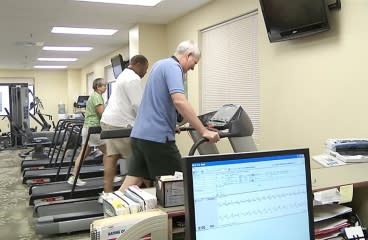Our Health Library information does not replace the advice of a doctor. Please be advised that this information is made available to assist our patients to learn more about their health. Our providers may not see and/or treat all topics found herein.
Topic Contents
Cardiac Rehabilitation: Exercise
Overview

Exercise is an important part of cardiac rehab. You may do some new exercises and may be asked to monitor yourself when you exercise.
Your rehab team will design a specific exercise program for you. It might range from a supervised program monitored by an exercise professional to an independent, self-managed program.
You will likely do aerobic exercise, strength training, and flexibility exercises.
- Aerobic exercises strengthen your heart and lungs and build up your endurance.
- Strength training exercises help tone and strengthen your muscles.
- Stretching helps you be more flexible and avoid injury.
For example, you may ride a stationary bike, walk on a treadmill, and do resistance training (working with weights).
Checking your heart
You'll learn how to check your heart rate to see how hard your heart is working while you exercise. You may also learn how to find your rate of perceived exertion (RPE). This tells you how hard you are exercising.
It is important to keep your heart rate from getting too high. So your doctor will tell you how fast your heart rate should be with exercise.
This type of self-monitoring is often used during the last stage of a rehab program. This is when you continue your cardiac rehab on your own without close supervision.
What are the benefits?
Everyone can benefit from exercise. But if you have some type of heart problem, the benefits of exercise will be even greater than for most people. Cardiac rehab exercises help you get back and keep your physical function.
A few months of exercise in a cardiac rehab program can make a difference. Your daily activities (such as carrying groceries) will be easier to do. You may also have an improved sense of wellness, because exercise can help with depression, stress, and anxiety.
Exercise can improve your quality of life, endurance, and muscle strength. It can help you return to work as soon as possible, live a more active lifestyle, and become more independent.
Cardiac rehab exercises also can:
- Lower your risk of dying of heart disease.
- Lower your blood pressure.
- Improve your cholesterol levels.
- Help you manage diabetes.
- Make your angina symptoms less severe and happen less often.
- Reduce your symptoms of heart failure.
- Help prevent a hospital stay for heart failure.
- Help you lose weight or stay at a healthy weight.
You can benefit from exercise whether you exercise at a high intensity for just a short time or at a low intensity for a longer period of time. If, for example, you are a person who finds exercising difficult, you still can obtain the benefits of regular exercise simply by walking.
Benefits of aerobic training
Your heart is a muscle. And like other muscles in your body, your heart will respond to exercise.
Your heart muscle has fibers that allow it to contract and pump blood. When you increase your heart rate during aerobic exercise, the heart fibers become stronger and more efficient. This not only strengthens the heart itself but also helps more blood circulate through your body. Blood contains oxygen and nutrients that increase the health and efficiency of many of your body's important systems.
Other benefits of aerobic exercise in cardiac rehab include:
- Increasing how well your body uses oxygen.
- Increasing how much air your lungs can take in and how well they do it.
- Reducing how hard your heart has to work at rest and during exercise.
- Reducing body fat.
Benefits of strength training
Strength training has many benefits for you during your recovery and in cardiac rehab. Strength training can:
- Increase the size and strength of your muscles.
- Improve how well your muscles use nutrients and oxygen.
- Increase how fast your body burns energy. This faster energy burn can help you manage your weight.
- Help improve your stability and reduce your chance of falling.
- Help increase your bone density and make your bones stronger, especially if you are older.
- Put less stress on your heart when you do daily activities such as lifting.
Related Information
Credits
Current as of: July 31, 2024
Author: Ignite Healthwise, LLC Staff
Clinical Review Board
All Ignite Healthwise, LLC education is reviewed by a team that includes physicians, nurses, advanced practitioners, registered dieticians, and other healthcare professionals.
Current as of: July 31, 2024
Author: Ignite Healthwise, LLC Staff
Clinical Review Board
All Ignite Healthwise, LLC education is reviewed by a team that includes physicians, nurses, advanced practitioners, registered dieticians, and other healthcare professionals.
This information does not replace the advice of a doctor. Ignite Healthwise, LLC disclaims any warranty or liability for your use of this information. Your use of this information means that you agree to the Terms of Use and Privacy Policy. Learn how we develop our content.
To learn more about Ignite Healthwise, LLC, visit webmdignite.com.
© 2024-2025 Ignite Healthwise, LLC.




